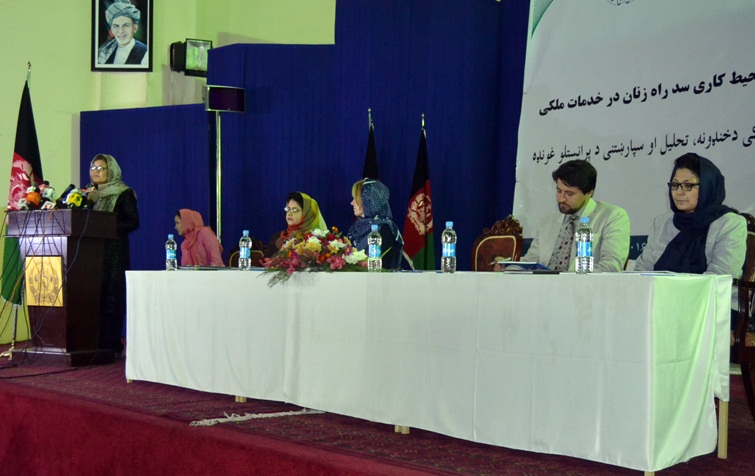By Farhad Naibkhel-KABUL: Ministry of Women’s Affairs on Tuesday released a report on “work place obstacles against women”, which showed that sexual harassment, cultural issue, lack of policy and adequate infrastructures are the main factors limited women working in governmental organs across the country.
The data presented in this report area based on findings of three survey questioners completed by 178 government employees.
“The report confirmed existence of harassment before women in governmental organs and due to this challenge some families do not let their daughters to work in governmental organs,” said Minister of Women’s Affairs Dilbar Nazari.
She said that harassments included verbal, visional, taunting and so on.
Street harassment is other challenge ahead of women and young girls, which need to be prevented, she added.
She said that lack of policy, regulation, adequate infrastructure and cultural issues as other challenges that limited women from working in governmental organs across the country.
Minister urged females to fight against harassment and continue to their work in governmental organs.
According to the survey sexual harassment is a hindrance to recruiting and retaining female staffs, and unfortunately it has become part of women’s in Afghanistan. Government offices are no exception to harassment.
Absence of a mechanism to address women’s complaints, is one of the main impediments to female participation in the workforces. A report by Women for Afghan Women found that in government institutions there are frequent accounts of verbal and physical harassment, blackmailing for sexual factors and the use of authority to coerce female employees for sexual acts.
The findings of research mentioned to a complete lack of policies and procedures regarding sexual harassment in government ministries. As demonstrated in the GIROA Partnership Assessment, except the IDLG, none of the ministries, agencies, and provincial offices interviewed had anti-harassment policies and regulations.
It was noticed in the report that the cases of harassment were rarely reported, because the victims feel that their reputation will be harmed. Moreover most of the cases that have been reported were not properly addressed.
In the survey mentioned to nepotism in hiring and firing, lack of supportive policy for women and cultural issues as other challenges that limited women working in governmental organs.
Ramp up insecurity also noticed as a challenge before women, the responders said that while the security situation deteriorates in cities particularly in Kabul capital women’s ability to safely and freely commute to work is severely impacted.
Lack of access to long term scholarship and education is other challenge that deterred women from hiring to the high posts.
The ministry asked all government and relevant organs to consider abovementioned women’s challenges seriously and take measures for solution.
 Afghanistan Times
Afghanistan Times




